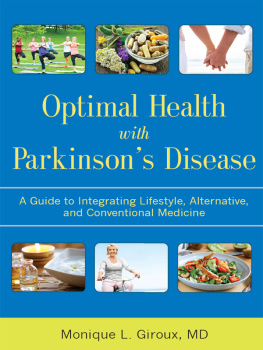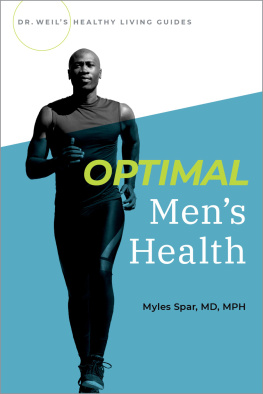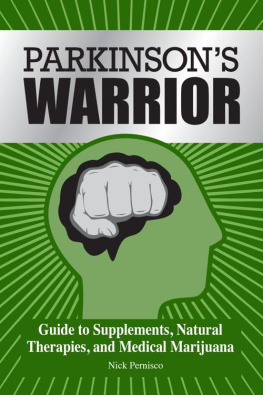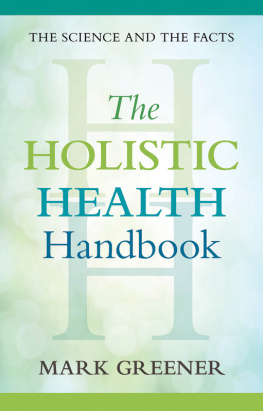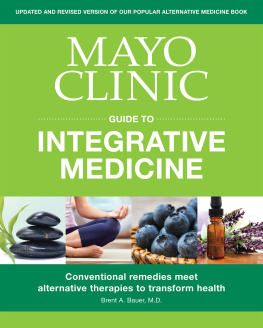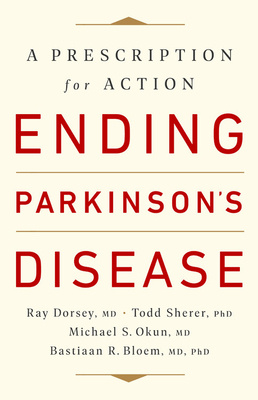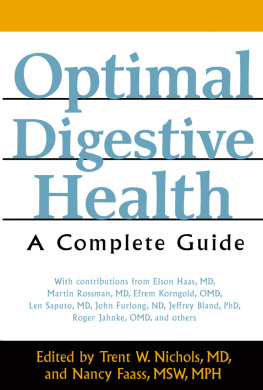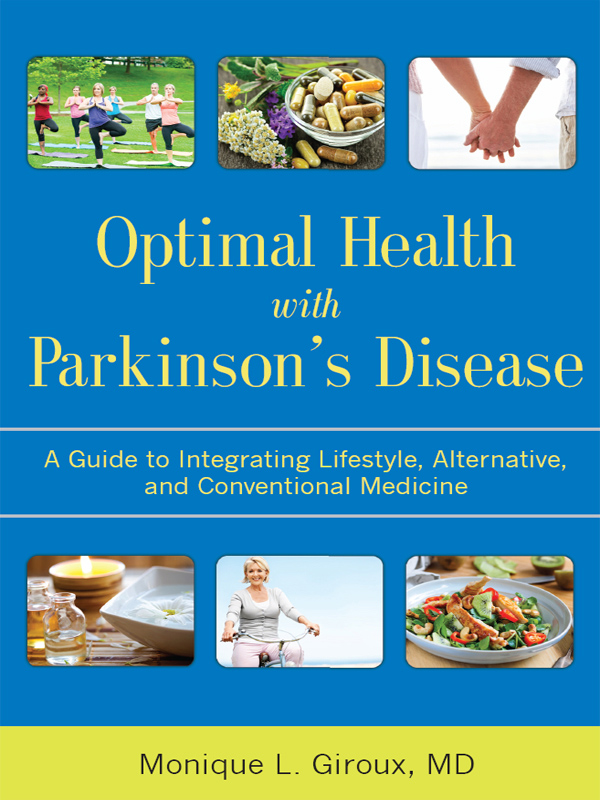Dr Giroux has written an excellent book for people with Parkinsons disease, based upon her years of clinical experience, her unique insights into the patient perspective, and her extensive knowledge of integrative medicine. This book will be a must-read for the many patients who are seeking a balanced, well-informed viewpoint on traditional and complementary aspects of PD care.
Melanie M. Brandabur, MD, Medical Director, Ultragenyx Pharmaceuticals
This book is a wonderful addition to understanding the importance of integrative medicine in Parkinson disease. It lays the groundwork for a comprehensive understanding and implementation of various therapies. It is a must have for patients and practitioners.
Rita Gandhy MD, MPH, Movement Disorders Neurologist, The Parkinsons Disease Institute
Exercise or medication alone is not enough. People with Parkinsons disease need to be empowered and educated at the stage of diagnosis with resources about what they can do to get better and stay better. Optimal Health with Parkinsons Disease provides a toolbox full of those resources which contain the potential to optimize brain health, symptoms, function, quality of life, and response to exercise and medication.
Becky Farley, PT, MS, PhD, Chief Executive Officer/Founder, Parkinson Wellness Recovery
Optimal Health with Parkinsons Disease
Also by Monique L. Giroux, MD
Alter Your Course: ParkinsonsThe Early Years (with Sierra M. Farris, PA-C)
DBS: A Patient Guide to Deep Brain Stimulation (with Sierra M. Farris, PA-C)
Every Victory Counts: Essential Information and Inspiration for a Lifetime of Wellness with Parkinsons Disease (with Sierra M. Farris, PA-C)
Optimal Health with Parkinsons Disease
A Guide to Integrating Lifestyle, Alternative, and Conventional Medicine
Monique L. Giroux, MD

Contents
Guide
Visit our website at www.demoshealth.com
ISBN: 978-1-936303-85-4
e-book ISBN: 978-1-61705-248-4
Acquisitions Editor: Julia Pastore
Compositor: Westchester Publishing Services
2016 by Monique L. Giroux. All rights reserved. This book is protected by copyright. No part of it may be reproduced, stored in a retrieval system, or transmitted in any form or by any means, electronic, mechanical, photocopying, recording, or otherwise, without the prior written permission of the publisher.
Medical information provided by Demos Health, in the absence of a visit with a health care professional, must be considered as an educational service only. This book is not designed to replace a physicians independent judgment about the appropriateness or risks of a procedure or therapy for a given patient. Our purpose is to provide you with information that will help you make your own health care decisions.
The information and opinions provided here are believed to be accurate and sound, based on the best judgment available to the authors, editors, and publisher, but readers who fail to consult appropriate health authorities assume the risk of injuries. The publisher is not responsible for errors or omissions. The editors and publisher welcome any reader to report to the publisher any discrepancies or inaccuracies noticed.
Library of Congress Cataloging-in-Publication Data
Giroux, Monique L., author.
Optimal health with Parkinsons disease : a guide to integrating lifestyle, alternative, and conventional medicine / Monique L. Giroux.
p. ; cm.
Includes bibliographical references and index.
ISBN 978-1-936303-85-4 (hardcopy : alk. paper) ISBN 978-1-61705-248-4 (ebook)
I. Title.
[DNLM: 1. Parkinson Diseasetherapy. 2. Parkinson Diseasediagnosis.
WL 359]
RC382
616.8'33dc23
2015030366
Special discounts on bulk quantities of Demos Health books are available to corporations, professional associations, pharmaceutical companies, health care organizations, and other qualifying groups. For details, please contact:
Special Sales Department
Demos Medical Publishing, LLC
11 West 42nd Street, 15th Floor
New York, NY 10036
Phone: 800-532-8663 or 212-683-0072
Fax: 212-941-7842
E-mail:
Printed in the United States of America by McNaughton & Gunn.
15 16 17 18 / 5 4 3 2 1
To my mother who shaped her own journey with chronic illness by showing compassion and empathy for others.
Contents
Introduction
By definition, Parkinsons disease (PD) is a movement disorder. In reality, PD is more than this label implies. Once diagnosis is made, the many non-motor symptoms become more apparent and often hold even greater significance than the movement symptoms. Motor symptoms and non-motor symptoms alike impact daily living. Coupled with this is the fact that PD is a progressive condition, which raises questions about the future.
How can I best prepare and, most importantly, what can I do to influence the future, the symptoms, of this disease?
It is so often the case that individuals living with PD, and indeed many progressive neurologic conditions, become defined by their symptoms. If symptoms are left unchecked, your life becomes the disease, with the quality of each day or moment determined by the degree or severity of these symptoms. Treatment too can focus only on symptoms, neglecting to support you as a person.
You are not your disease. But you are living with your disease. Living your best, then, means a focus that extends beyond the treatment of symptoms. It means having a broader focus that encompasses emotional adaptation, resiliency, personal healing, and prevention. You are unique not just in the symptoms you experience but also in how you approach life and live life with PD.
This book is written to help you live and thrive. It is intended to help you move beyond a reductionist and traditional approach defined by symptoms to an integrative or holistic approach. This approach respects you as a person and reinforces the concept that traditional medical therapies work best when you are empowered and supported in your quest to influence healing on an emotional, physical, and even physiologic level.
An integrative approach complements traditional medical care, which focuses on medications and surgical interventions, by introducing therapies designed to promote personal healing and well-being. In conventional or traditional medicine, these therapies or healing arts are often referred to as alternative or complementary, implying that they are somehow different in their approach or intention. These therapies are perhaps different in their focus on personal empowerment and healing, but not in their goal of better outcomes and better living.
Many physicians are leery of these approaches and sometimes for good reason. Conventional medicine and treatments are held to the principle of evidence-based medicine. Treatments undergo aggressive testing, ideally controlling for more generalized effects such as the placebo effect. (You will learn more about this important topic as you read the chapters.) The Food and Drug Administration (FDA) regulates the use of treatments, defining the specific conditions or disease for their use and further ensuring that the benefits outweigh the risks for each therapy.
Alternative therapies are not as strictly regulated and are a multibillion dollar industry subject to strong commercial and marketing influences. Without regulation, such treatments are often promoted to treat symptoms and even cure disease without the evidence to support these claims. Anecdotal reports and personal stories touting benefit are often used to sell a product or treatment, while the results of rigorous testing and direct outcomes to support these claims are overlooked. Physicians and patients alike must navigate the truth from the hype and evaluate them with a critical eye.

